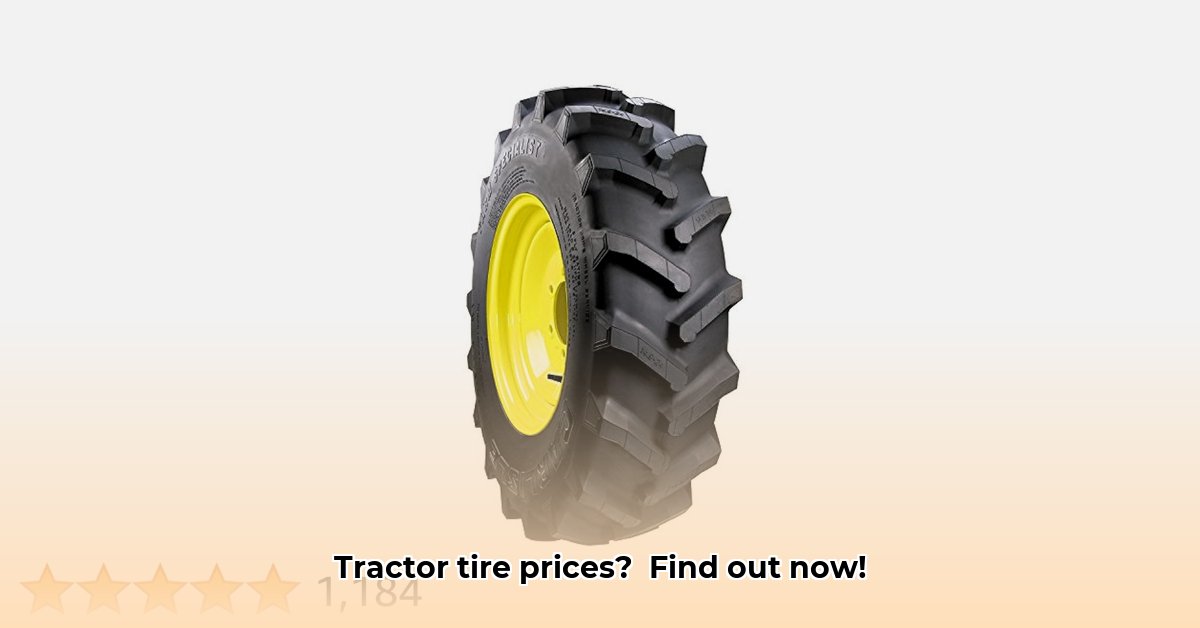
How Much Do Tractor Tires Cost?
The cost of tractor tires varies significantly, ranging from a few hundred dollars to over two thousand for a single tire. Several factors influence this price range, making it crucial to understand these variables before making a purchase. Are you wondering how to get the best value for your money? Let's dive in! For example, check out this tire size guide.
Understanding the Cost Variables
Several key factors drive the price of tractor tires:
Size: Larger tires, needing more material and manufacturing, inherently cost more. Think of it like buying a larger pizza – it naturally costs more than a smaller one.
Brand: Established brands often command a premium due to their reputation for quality and durability. This is similar to the automotive market, where well-known brands often reflect a higher investment in research and development.
Condition: New tires are the most expensive upfront. Used tires can offer significant savings but carry the risk of hidden damage, potentially negating any initial cost advantage. A thorough inspection is always recommended.
Here's a general price range (though actual costs can vary based on location, specifics, and market conditions):
| Tire Condition | Approximate Cost Range (USD) |
|---|---|
| New | $400 - $2,500+ |
| Used | $50 - $1,000+ |
Decoding Tractor Tire Types: R1, R3, and R4
Three main types of tractor tires cater to different needs and terrains:
R1 (Agricultural): Designed for maximum traction in fields, ideal for plowing and heavy loads, but can damage delicate surfaces.
R3 (Turf): Minimize ground disturbance, perfect for lawns and sensitive crops but offer less traction than R1 tires.
R4 (Industrial): Offer a balance of traction and ground protection, making them versatile for various terrains.
Tire Type Comparison: Pros & Cons
| Tire Type | Pros | Cons |
|---|---|---|
| R1 (Agricultural) | Exceptional traction; perfect for heavy fieldwork | Can damage turf; less suitable for paved surfaces |
| R3 (Turf) | Minimizes ground compaction; protects delicate areas | Reduced traction compared to R1; not for heavy loads |
| R4 (Industrial) | Versatile; balances traction and ground protection | May not offer maximum traction in all conditions |
Choosing the right tire type significantly impacts both your operational efficiency and long-term costs. Wouldn't you agree that selecting the correct tire is essential for your farm's success?
Preventative Maintenance: A Tire's Best Friend
Regular maintenance drastically extends tire life and saves money. Follow these steps:
Pressure Checks: Regularly check tire pressure (weekly is ideal) using a reliable gauge. Underinflation causes uneven wear and premature failure.
Visual Inspections: Inspect tires for cracks, bulges, embedded objects, and uneven wear patterns. Address any issues promptly.
Cleaning: Keep tires clean to prevent hidden damage and extend their lifespan.
Storage: Proper storage protects tires from elements and prolongs their life.
Early Problem Detection: Timely attention to minor issues prevents costlier repairs later.
Cost-Benefit Analysis: Prevention vs. Replacement
The cost of preventative maintenance is far outweighed by the cost of premature tire failure. Regular inspections and maintenance prevent costly downtime and replacements. Have you considered the potential savings from careful tire management?
New vs. Used Tires: A Prudent Choice
New tires are a significant upfront investment, but they provide reliability and longevity. Used tires offer cost savings but require thorough inspection to avoid hidden damage. Weigh the pros and cons carefully.
Sustainable Disposal: Environmental Responsibility
Dispose of old tires responsibly; check your local regulations for recycling options. Reducing landfill waste is essential for environmental protection.
Conclusion: Proactive Tire Management for Long-Term Savings
Understanding tractor tire costs, preventative maintenance, and responsible disposal practices are vital for maximizing efficiency and minimizing expenses. By making informed decisions, you'll significantly extend the life of your tires and ensure smooth, cost-effective farm operations. Isn't that a worthwhile investment?